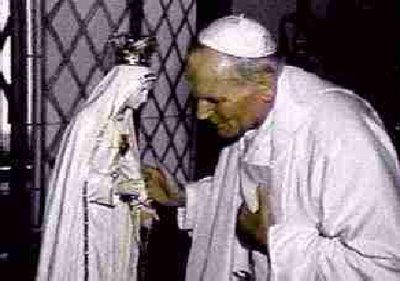
Much time, energy, prayer and discernment went into the canonization of Scripture in the fourth century. The present canon of Scripture didn't "fall from the sky," but required much prayerful debate and discussion by the early Church fathers. Why was so much time and effort spent in discernment of the many books and letters that were eventually included in the bible? Was this process done for the end result that the people at that time could have Scripture available for personal devotional time? No, there was no printing press available and literacy rates were very low so the purpose was not to distribute the Bible to the masses, but provide the Bible for the Mass. The canonization of Scripture was accomplished to provide the Church with the correct inspired Scriptures for readings at the Mass.
The early Church was still very Jewish and Scripture reading comprised a significant portion of the Mass as it does today. I found a
website that shows just how much of Scripture is interwoven in the liturgy of the Mass. It really made me quite ashamed for my accusations that Catholics don't read the Bible and don't use Scripture. I was clearly mistaken. You may be surprised too!
Commentary appears in green.
Greeting:
Priest: In the Name of the Father and of the Son and of the Holy Spirit. (Matt. 28:19)
People: Amen (1 Chr 16:36)
Priest: The grace of our Lord Jesus Christ and the love of God and the fellowship of the Holy Spirit be with you all. (2 Cor 13:13)
People: And also with you.
Penitential Rite:
All: I confess to almighty God, and to you my brothers and sisters, that I have sinned through my own fault. (Jas. 5:16) In my thoughts and in my words, (Rom. 12:16) In what I have done and what I have failed to do; (Jas 3:6) and I ask the Blessed Virgin Mary, all the angel and saints, and you, my brothers and sisters, to pray for me to the Lord our God. (1 Thess 5:25)
Priest: May almighty God have mercy on us, forgive us our sins, and bring us to everlasting life. (1 John 1:9)
People: Amen (1 Chr 16:36)
All: Lord have mercy. (Tb 8:4) Christ have mercy. (1 Tim 1:2) Lord have mercy.
Gloria:
All: Glory to God in the highest, and peace to his people on earth. (Luke 2:14)
Lord God, heavenly King, almighty God and Father, (Rev 19:6)
we worship you, (Rev. 22:9) we give you thanks, (Eph. 5:20)
we praise you for your glory. (Rev 7:12)
Lord Jesus Christ, only Son of the Father, (2 John 3)
Lord God, Lamb of God, you take away the sin of the world:
have mercy on us; (John 1:29)
You are seated at the right hand of the Father, receive our prayer. (Rom 8:34)
For you alone are the Holy One, (Luke 4:34)
You alone are Lord, You alone are the Most High, Jesus Christ. (Luke 1:32)
with the Holy Spirit, in the glory of God the Father. (John 14:26)
[The Liturgy of the Word consists of four readings from Scripture: the first is typically from the Old Testament, the second a psalm, followed by a reading from one of the epistles. Finally, the Gospel is proclaimed during which the people stand out of respect for the Word. The chosen readings change daily.]
Click here to get today’s liturgical readings from the United States Conference of Catholic Bishops.
[A Sermon on the readings follows.] (2 Tim 4:1-2)
Profession of Faith: [the Nicene (or Apostles) Creed]
All:
We believe in one God, the Father Almighty, maker of heaven and earth, (Gen 14:19) of all that is seen and unseen. (Col 1:16)
We believe in one Lord Jesus Christ, the only Son of God, (Luke 1:35) eternally begotten of the Father, God from God, Light from Light, True God from True God, begotten not made, one in being with the Father. (Heb 1:3) Through him all things were made. (John 1:2-3) For us men and for our salvation he came down from heaven: (John 3:13) by the power of the Holy Spirit he was born of the Virgin Mary, (Matt 1:18) and became man.
For our sake he was crucified under Pontius Pilate, (John 19:16) he suffered, died and was buried. On the third day he rose again in fulfillment of the Scriptures. (1 Cor 15:3-4) He ascended into heaven (Luke 24:51) and is seated at the right hand of the Father. (Col 3:1) He will come again in glory to judge the living and the dead (2 Tim 4:1) and his kingdom will have no end. (Luke 1:33)
We believe in the Holy Spirit, the Lord, the giver of Life, (Acts 2:17) who proceeds from the Father and the Son. (John 14:16) With the Father and Son he is worshiped and glorified. He has spoken through the prophets. (1 Peter 1:10-11)
We believe in one holy, catholic and apostolic Church. (Rom 12:5) We acknowledge one baptism for the forgiveness of sins. (Acts 2:38) We look for the resurrection of the dead and the life of the world to come. (Rom 6:5) Amen
Liturgy of the Eucharist:
[The gifts are brought to the altar. These include the bread and wine and the offering collected from the people.] (Malachi 3:10)
Priest: Blessed are you, Lord, God of all creation. Through your goodness we have this bread to offer, which earth has given and human hands have made. (Eccl. 3:13) It will become for us the bread of life. (John 6:35)
People: Blessed be God forever. (Ps 68:36)
Priest: Blessed are you, Lord, God of all creation. Through your goodness we have this wine to offer, fruit of the vine and work of human hands. It will become our spiritual drink. (Luke 22:17-18)
People: Blessed be God forever. (Ps 68:36)
Priest: Pray, brethren, that our sacrifice may be acceptable to God, the almighty Father. (Heb. 12:28)
People: May the Lord accept the sacrifice at your hands for the praise and glory of his name, for our sake and the good of all his Church. (Ps 50:23)
Eucharistic Prayers:
Priest: Lift up your hearts.
People: We lift them up to the Lord. (Lam 3:41)
Priest: Let us give thanks to the Lord Our God. (Col 3:17)
People: It is right to give him thanks and praise. (Col 1:3)
Preface acclamation:
All: Holy, holy, holy Lord, God of power and might, heaven and earth are full of your glory. (Is 6:3) Hosanna in the highest. Blessed is he who comes in the name of the Lord. Hosanna in the highest. (Mark 11:9-10)
Eucharistic prayer:
[There are four of these, based on ancient prayers of the Church. Eucharistic Prayer Two follows as an example:]
Priest: Lord, you are holy indeed, the fountain of all holiness. (2 Macc. 14:36) Let your spirit come upon these gifts (water and wine) to make them holy, so that they may become the body and blood of our Lord Jesus Christ. Before he was given up to death, (Phil 2:8) a death he freely accepted, (John 10:17-18) he took bread and gave you thanks. He broke the bread, gave it to his disciples, and said: Take this all of you, and eat it: this is my body which will be given up for you. When supper was ended, he took the cup. Again he gave thanks and praise, gave the cup to his disciples, and said: Take this, all of you, and drink from it: this is the cup of my blood, the blood of the new and everlasting covenant. It will be shed for you and for all so that sins may be forgiven. Do this is memory of me. (Mark 14:22-25) Let us proclaim the mystery of faith.
All: Dying you destroyed our death, rising you restored our life, Lord Jesus, come in glory. (Heb 2:14-15)
Priest: In memory of his death and resurrection, we offer you, Father, this life-giving bread, this saving cup. (John 6:51) We thank you for counting us worthy to stand in your presence and serve you. May all of us who share in the body and blood of Christ be brought together in unity by the Holy Spirit. (1 Cor.10:17) Lord, remember your Church throughout the world; make us grow in love together with our Pope and our bishop, and all the clergy. Remember our brothers and sisters who have gone to their rest in the hope of rising again: bring them and all the departed into the light of your presence. (2 Macc 12:45-46) Have mercy on us all; make us worthy to share eternal life with Mary, the virgin Mother of God, with the apostles and with all the saints who have done your will throughout the ages. May we praise you in union with them, and give you glory though your Son, Jesus Christ. (2 Thes 1:4-5) Through him, with him, in him, in the unity of the Holy Spirit, all glory and honor is yours, almighty Father, for ever and ever.
All: Amen. (Rom 11:36)
Communion Rite:
The Lord’s Prayer:
All: Our Father who art in heaven, hallowed be thy name. Thy kingdom come, thy will be done on earth as it is in heaven. Give us this day our daily bread and forgive us our trespasses as we forgive those who trespass against us. And lead us not into temptation, but deliver us from evil. (Matt 6:9-13)
Priest: Deliver us, Lord, from every evil and grant us peace in our day. In your mercy keep us from sin and protect us from all anxiety as we wait in joyful hope for the coming of our savior, Jesus Christ. (John 17:15)
All: For the kingdom the power and the glory are yours, now and forever. Amen
Priest: Lord Jesus Christ, you said to your apostles; I leave you peace, my peace I give to you. (John 14:27) Look not on our sins, but on the faith of your Church, and grant us the peace and unity of your kingdom where you live forever and ever.
Priest: The peace of the Lord be with you always! (John 20:19)
People: And also with you!
[The priest then directs the people to exchange a sign, such as a handshake or a kiss, or a word of God’s peace to one another.]
Breaking of the Bread:
All: Lamb of God, you take away the sins of the world: have mercy on us. Lamb of God, you take away the sins of the world: have mercy on us. Lamb of God, you take away the sins of the world, grant us peace. (John 1:29)
Communion:
Priest: This is the Lamb of God who takes away the sins of the world. Happy are those who are called to his supper. (Rev. 19:9)
People: Lord, I am not worthy to receive you, but only say the word and I shall be healed. (Matt 8:8)
[Communion is distributed to the faithful at the altar by the priest and lay ministers.]
Dismissal:
Priest: Blessed be the name of the Lord. Now and forever. (Dan 2:20) May almighty God bless you, the Father, and the Son, and the Holy Spirit. (Luke 24:51) Go in peace (Luke 7:50) to love and serve the Lord. (2 Chr 35:3)
[During the blessing the people make the Sign of the Cross, the traditional sign of the baptized and a public sign of their belief in the power of God.]
People: Thanks be to God. (2 Cor 9:15)




















